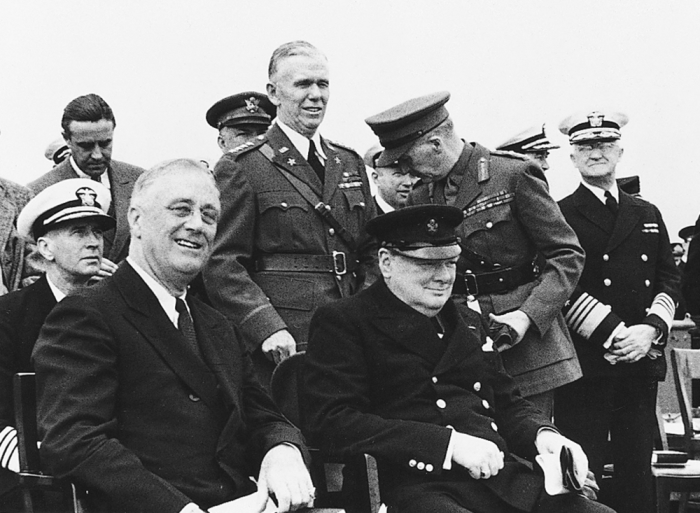God, Churchill, and Christian Civilization

The United States — and the whole West — stands at a critical point. Will Western Civilization continue to enjoy the fruit of the worldview arising from Judeo-Christian belief, or will it go from twilight to darkness in our lifetimes?
Winston Churchill's birthday, November 30, 1874, should inspire reflection on what many consider the twentieth century's greatest leader thought about civilization. This is especially important as America and the West enter a new phase and perhaps a period of redefinition.

Despite the attempt by some to freeze Churchill into a youthful period of spiritual doubt and confusion, Churchill ultimately believed in God, the inspiration and literal history of the Bible, and Jesus Christ as "unsurpassed in His capacity to save sinners" — a confession Churchill made to Field Marshall Montgomery.
Jonathan Sandys — Churchill's great-grandson — and I document this in our book, God and Churchill. Sir Martin Gilbert, Churchill's official biographer, told Jonathan there was much evidence for Churchill's faith, and encouraged us to explore it.
Churchill's lifestyle might not always be reflective of fundamentalist Christianity, yet his beliefs in the fundamentals were deep-rooted, going back to his childhood and the influence of his devout nanny, Elizabeth Everest.
Churchill believed in the "certain way of life" that was the fruit of Christian Civilization. It was characterized by "the conception of the right of the individual; his right to be consulted in the government of his country; his right to invoke the law even against the State itself ..." Churchill said that "in this resides all that makes existence precious to man, and all that confers honor and health upon the State."
Churchill thought it his destiny to save this "certain way of life." Jesus' Sermon on the Mount was the core of Christian ethics, and the sure guide to success in "our endeavors," said Churchill.
The following, taken from God and Churchill, reveals the depth of Churchill's conviction:
- "I expect that the battle of Britain is about to begin ... Upon this battle depends the survival of Christian civilization." (June 18, 1940)
- It is "our duty to preserve the structure of humane, enlightened, Christian society." (a 1931 magazine article)
- In 1938 Churchill asserted "there can never be friendship between the British democracy and the Nazi power" because "that power ... spurns Christian ethics."
- As he contemplated the defense of London during the Battle of Britain, Churchill referred to the metropolis as "this strong City of Refuge which enshrines the title-deeds of human progress and is of deep consequence to Christian Civilization ..."
- "It is no exaggeration to say that the future of the whole world and the hopes of a broadening civilization founded upon Christian ethics depends upon the relations between the British Empire or Commonwealth of Nations and the USA," Churchill said in 1941.
- In his famous "Iron Curtain" speech on March 5, 1946, Churchill was still sounding the warning. The Communist parties that had infiltrated post-war nations "constitute a growing challenge and peril to Christian Civilization," he said.
- Churchill revealed to Britain's Conservative Party leadership in October, 1946 what he felt its "main objectives" should be. The list begins: "To uphold the Christian religion and resist all attacks upon it..."
- In a 1949 speech to scientists at Massachusetts Institute of Technology, Churchill said: "The flame of Christian ethics is still our highest guide. To guard and cherish it is our first interest, both spiritually and materially. The fulfillment of spiritual duty in our daily life is vital to our survival. Only by bringing it into perfect application can we hope to solve for ourselves the problems and not of this world alone."
In God and Churchill Jonathan Sandys and I juxtapose Hitler's vision for a new society — the Third Reich — with Churchill's vision of a civilization established on Jesus' teaching and the Judeo-Christian worldview. The profound ugliness of the Nazi cause became starkly evident to Churchill in the brilliance of the Light of the world.
If Donald Trump is to understand the nations and forces he faces as president, he must see the big picture as Winston Churchill did.
There is currently both profound distress on the one hand and exuberant triumphalism — excuse the pun — on the other as the new Trump administration assumes power in Washington. But, as Churchill believed and preached, our hope is in something that transcends the cultural tide of the moment. It is the extraordinary teaching of a remarkable Jewish carpenter in an obscure land nestled in an unremarkable historical streak, but made exceptional because of Him.
It would be well for Donald Trump and those he is raising to authority to study the Sermon on the Mount and Churchill's understanding of its foundational role in creating a civilization that he believed could be a blessing to the whole world.
Neither Trumpism nor Hillary-style progressivism can save us. Only a serious commitment to the Carpenter from Nazareth and an appreciation of His teaching like that of a claret-sipping, cigar-chomping politician can bring us through our quaking times.
Winston Churchill proved it in his day.




























